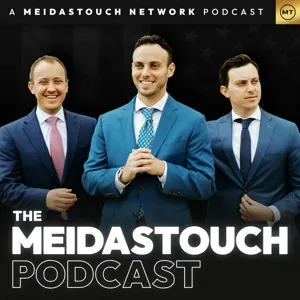Podcast Summary
Trump's Efforts to Overturn 2020 Election Presented as Single Case with Multiple Criminal Offenses: Special Counsel Jack Smith charges Trump with multiple crimes for attempting to subvert the 2020 election through various actions, including pressuring state officials and recruiting fraudulent electors, all presented as a single case under three different criminal statutes.
Special Counsel Jack Smith's indictment of former President Trump for attempting to subvert the 2020 election is unique in its structure, presenting a long narrative of Trump's efforts to overturn the election rather than discrete charges with accompanying evidence. This narrative encompasses various actions, such as pressuring state officials to declare fraud and recruiting fraudulent electors. The grand narrative is charged under three different criminal statutes - conspiracy to defraud the government, conspiracy to obstruct an official proceeding, and conspiracy to disenfranchise voters - each offering an independent lens to view the same set of actions. By presenting the entire narrative as a single case, Smith's team is able to argue that Trump's actions constitute multiple criminal offenses.
Building and suspending legal strategy for Trump charges: Special Counsel Jack Smith is using a complex legal strategy with redundant charges to ensure Trump faces consequences for his role in election interference attempts.
Special Counsel Jack Smith is using a multi-pronged legal strategy to charge former President Trump for his role in the attempt to obstruct the certification of the 2020 presidential election results. Smith is using the same facts to bring charges under multiple criminal statutes, creating redundant layers as a safety net. This strategy, known as "building and suspending," allows Smith to keep moving forward even if one charge fails. The complexity of this unprecedented case makes this approach necessary, as there is no clear precedent for how courts or juries will interpret these statutes in this context. Smith likely believes that most charges will succeed, but he is preparing for the possibility of holdout jurors or appeals. In essence, he is ensuring that something remains to charge and convict Trump, even if not all charges survive.
Multi-faceted approach to charging Trump: Special Counsel Jack Smith's indictment against Trump includes various charges, but lacks incitement or sedition charges and detailed evidence about the Capitol violence. The First Amendment's protection of free speech and pre-planned violence could pose challenges.
The indictment brought against Donald Trump by Special Counsel Jack Smith is not a comprehensive legal strategy, but rather a multi-faceted approach with various charges. The absence of charges related to incitement or sedition, as well as the lack of detailed evidence about the violent events on January 6th, raises questions. The first amendment's protection of free speech could pose challenges in proving Trump directly incited violence. Additionally, some of the violent actions at the Capitol were allegedly planned before Trump's speech. These factors might explain why Smith did not include these charges in his indictment. However, without further information from Smith, the reasons for these omissions remain unclear.
Trump's Legal Battle: Free Speech vs. Solicitation of Crimes: The legal case against Trump for election interference hinges on the balance between his First Amendment right to express opinions and the unlawfulness of soliciting criminal actions.
The ongoing legal case against Donald Trump for his actions related to the 2020 presidential election involves complex issues surrounding free speech and solicitation of crimes. Trump's lawyers are expected to mount a defense based on the First Amendment, arguing that the former president had the right to express his opinions publicly and privately about the election results. However, Special Counsel Jack Smith is framing Trump's private speech as not protected by the First Amendment, as it involves soliciting criminal actions. The case is further complicated by Smith's argument that Trump's public speech played a role in creating an atmosphere of suspicion and pressure on Republican officials, potentially contributing to the criminal plans. The outcome of this novel case will depend on how the courts interpret these nuanced legal issues.
First Amendment defense for private and public speech: Defense team may argue for First Amendment protection for both private and public speech in Trump's legal proceedings, but intent defense, claiming belief in protecting democracy, may also be used, yet previous cases suggest these defenses might not be successful.
In the ongoing legal proceedings against Donald Trump, the defense team may argue for a First Amendment defense based on the indictment's inclusion of both Trump's private and public speech. The defense argues that these forms of speech cannot be easily disentangled as they were integral to the alleged criminal plans. Another potential defense is the intent defense, where Trump may claim that he genuinely believed he had won the election and his efforts to overturn the results were motivated by a desire to protect democracy, not destroy it. However, previous cases involving January 6 rioters using similar defenses have not been successful, as the judges have ruled that the legality of the actions taken, regardless of the defendant's beliefs, is the focus of the case.
Trump's Legal Consequences for Capitol Riots: Trump could face charges for Capitol riots despite believing actions were lawful. Investigation includes charges of voter disenfranchisement and government fraud to establish corrupt intent. Success of 'advice of counsel' defense depends on full disclosure and objectively reasonable theory.
Former President Trump could face legal consequences for his actions leading up to the Capitol riots, even if a jury believes he genuinely believed he was acting lawfully. The ongoing investigation into Trump's actions includes charges of conspiring to disenfranchise voters and defraud the government, which could be used to establish corrupt intent, regardless of his personal beliefs. Furthermore, Trump may attempt to use the "advice of counsel" defense, arguing that he relied on the advice of his lawyer, John Eastman, who told him he had the authority to contest the election results. However, the success of this defense would depend on whether Trump disclosed all relevant facts to Eastman and whether the theory was objectively reasonable.
Trump's Legal Team to Use 'Throw Everything' Defense Strategy: Trump's team plans to use a broad defense strategy, while factors like political leanings and case complexity could impact outcomes.
Trump's legal team is expected to use a "throw everything against the wall and see what sticks" defense strategy in response to the various indictments against him, including the high-profile election case brought by Special Counsel Jack Smith. While some cases, like the documents case, may seem stronger based on the available evidence and legal precedent, factors outside the indictments, such as the political leanings of the judges and jury pools, could potentially sway the outcome. The complexity of the election case, with its untested statutes and potential defenses, also makes it a harder sell to a jury compared to the more straightforward documents case.
The outcome of the Trump election case depends on various factors: The Trump election case's outcome hinges on a democratic judge, the jury, facts, law, and evidence. Yellow's bankruptcy affects 30,000 jobs and supply chain due to mergers, labor disputes, and uncertain loan repayment.
The outcome of the election case against Donald Trump depends on various factors including the judge, the jury, the facts, the law, and the evidence. The case was assigned to a democratic appointed judge known for her tough sentences against January 6 rioters, which could potentially make the case stronger due to the Democratic-leaning jury pool in DC. However, the strength of the case ultimately relies on the specifics of the case, the legal arguments, and the defense. Elsewhere, Yellow, a major trucking company, filed for bankruptcy, leading to the loss of about 30,000 jobs and potential disruptions to the supply chain. The company's financial struggles stemmed from mergers, labor disputes, and a large loan from the US government during the pandemic, the repayment of which remains uncertain.





